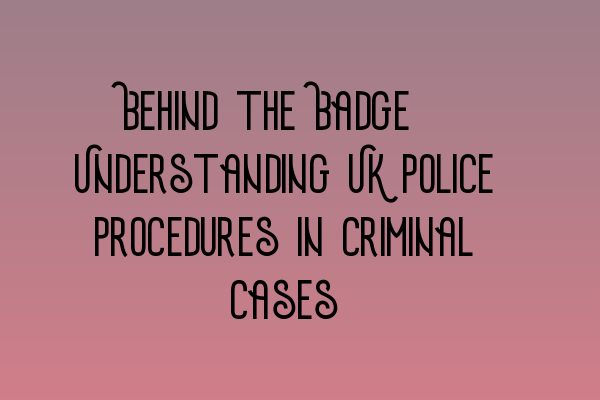Behind the Badge: Understanding UK Police Procedures in Criminal Cases

When facing criminal charges in the UK, it is essential to understand the procedures followed by the police during investigations and arrests. This knowledge can help you navigate the legal system and protect your rights. In this article, we will delve into the intricacies of UK police procedures in criminal cases and shed light on the behind-the-scenes mechanisms.
1. Investigation Stage
The investigation stage is a crucial part of any criminal case. It involves the gathering of evidence to establish the facts and determine whether there is enough evidence to proceed with formal charges. During this stage, the police may conduct interviews, take statements, gather forensic evidence, and gather any other relevant information.
It is important to note that the police must operate within the confines of the law and adhere to certain principles, such as the Preservation of Evidence and the Chain of Custody. These principles ensure that the evidence presented in court is reliable and admissible.
2. Arrest and Detention
If the police have reasonable grounds to suspect that you have committed an offense, they may arrest you. During the arrest, the police will inform you of the reasons for your arrest and your rights, commonly known as Miranda rights.
Once arrested, you may be subjected to custodial detention for a limited period. The police must follow specific procedures while detaining you, such as providing access to legal representation and periodic review of your detention. It is crucial to be aware of your rights during this process to ensure fair treatment.
3. Questioning and Interviewing
During the investigation, the police may question and interview both suspects and witnesses. If you are a suspect, you have the right to remain silent and not answer any questions. It is advisable to seek legal advice before providing any statements or incriminating information.
The police must conduct interviews in a fair and even-handed manner, without exerting undue pressure or coercion. If any procedural irregularities occur during the questioning process, it may have implications for the admissibility of statements in court.
4. Charging and Bail
After the investigation is complete, if the police believe that there is enough evidence to proceed, they may charge you with a criminal offense. The decision to charge is subject to legal scrutiny and must be based on the evidence gathered during the investigation.
If you are charged, the police will decide whether to release you on bail or keep you in custody until your court appearance. The decision on bail is guided by several factors, including the seriousness of the offense, the likelihood of reoffending, and the risk of interference with the investigation.
5. Court Proceedings
Once charged, you will go through court proceedings, where the evidence against you will be presented, and your defense will have the opportunity to challenge it. Police officers involved in the investigation may be called as witnesses to testify and provide evidence.
It is vital to engage the services of a competent criminal defense solicitor who can assess the evidence, build a robust defense strategy, and present your case effectively in court. A skilled solicitor can navigate the complex legal procedures and provide you with the best chance of a favorable outcome.
Understanding UK police procedures in criminal cases can empower you to protect your rights, make informed decisions, and work collaboratively with your legal team. By being aware of your rights, the behind-the-scenes mechanisms, and the importance of legal representation, you can navigate the criminal justice system effectively.
